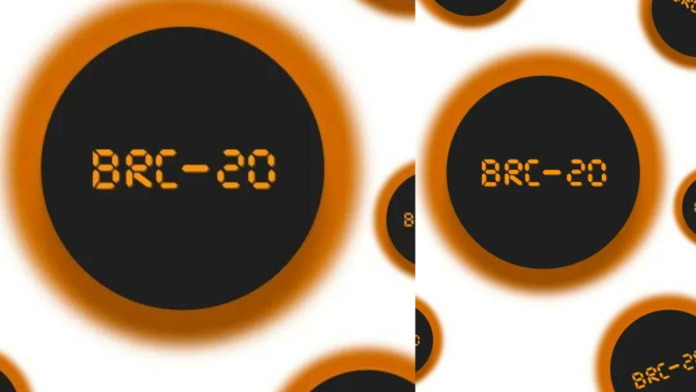Maria Irene
In the constantly shifting terrain of cryptocurrencies and blockchain technology, a ‘storm’ is beginning to gather momentum. The storm finds its genesis in the ongoing debate around the decentralization of BRC20 indexing within Ordinal Finance (OrdFi). To an observer, it closely resembles a chess match of high stakes, with the pieces being indexers, decentralization purists, and crypto enthusiasts. The battleground? Twitter, the contemporary equivalent of an ancient agora.
The debate was sparked by Satoshi.ob, a voice in the community. His chief objection pertains to the “absolute centralization” of BRC20 indexing, a situation he contends contradicts the blockchain’s fundamental spirit, as envisioned by the elusive creator of Bitcoin, Satoshi Nakamoto. His contention uncorks a host of issues, many of which mirror wider dialogues about decentralization in the crypto realm.
Indexing, crucial in the crypto arena, involves presenting blockchain data in an accessible format. Satoshi.ob argues that the centralization of this process introduces a single point of potential failure. This mirrors the concerns of the Internet’s pioneers who worried about an over-dependence on centralized servers.
While some, such as CrimsonElep, uphold the status quo of indexing, arguing that a natural consensus will eventually form among indexers. Even if a singular point were to fail, the immutability of the blockchain would allow all transactions to be restored, nullifying the ‘single point of failure’ risk.
Satoshi.ob, however, rejects this rebuttal, questioning the ‘consensus’ nature. To him, a handful of centralized nodes aligning doesn’t depict a true consensus, but rather indicates centralized dominance. He advocates for a system where individuals can run their own indexers, independently verifying the network without unwarranted trust in a single entity.
This discourse is much more than a localized disagreement. It could reshape the future of BRC20 Indexing and reverberate throughout the ordinals world. Satoshi.ob strongly supports a shift towards Decentralized Indexing, fearing systemic failure and censorship in the current model.
In an astute counter, CrimsonElep claims the ‘single point of failure’ critique is void, stating that the blockchain’s unchanging nature can resurrect all transactions related to BRC20 and Ordinals, even if the ‘single point’ collapses. Satoshi.ob, however, remains skeptical about the nature and location of this “consensus”.
The debate is a tug-of-war between centralized and decentralized models, reflecting broader conversations about blockchain’s philosophy, consensus nature, and the future of decentralized finance.
As BRC20 and OrdFi grow, Satoshi.ob worries about the long-term consequences of centralized indexers. He advocates for decentralized indexers and a new set of standards for BRC20/OrdFi.
The heart of this debate rests on Satoshi Nakamoto’s vision: a decentralized, consensus-based system that side-steps traditional financial institutions. To Satoshi.ob, this vision is threatened by centralized indexers. The debate also raises the specter of potential bias, particularly if centralized entities perceive new standards as threats to their dominance.
With the expansion of OrdFi and the introduction of decentralized exchanges (DEX) or Smart Inscriptions, existing centralized entities may feel threatened. As Satoshi.ob points out, they might resist changes, leading to delayed updates or biased behavior, contrasting with blockchain’s transparent ideals.
The future of BRC-20 could pivot on this debate. Will the community steer towards a more decentralized model, or will centralized entities retain their grip on indexing? The Ordinals and Brc-20 community need to address this debate, as it pertains to the crypto space’s future, its ethos, and the delicate balance between efficiency and decentralization. The challenge lies in ensuring the ecosystem adheres to its founding principles while also accommodating growth and evolution.
The next moves on this digital chessboard will be critical. As enthusiasts, technologists, and spectators wait with bated breath, the destiny of ordinals could be irrevocably altered by this intense tussle. The Decentralization Debate might appear abstract, but it carries tangible implications for technology, finance, and society at large.
The turbulence surrounding BRC20 Indexing could serve as a wake-up call for the crypto world to reflect on its guiding principles, challenge the status quo, and build a system resistant to both technological and ideological single points of failure. The ghost of Satoshi indeed stirs uneasily. To honor its creator, the crypto community must rally together, reaffirming the ethos of decentralization amid swift growth and evolution.
Ultimately, this ‘crypto storm’ may foretell a more resilient, decentralized future, one that aligns with the very ethos of the technology it’s built upon. Will the storm pave the way for a more decentralized crypto realm, or will it leave behind a landscape still shackled by the constraints of centralization? Only time will reveal the aftermath of this storm.
|
|


